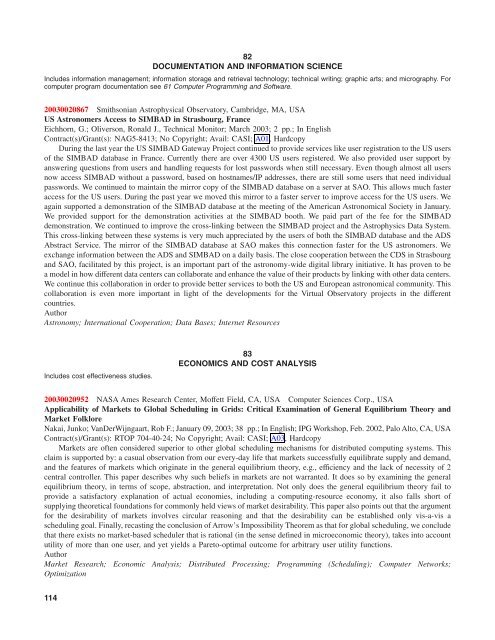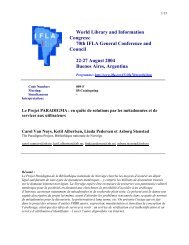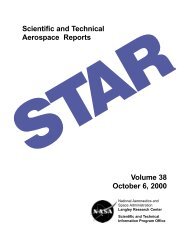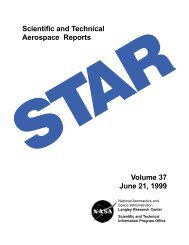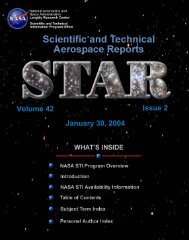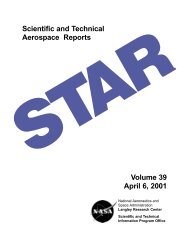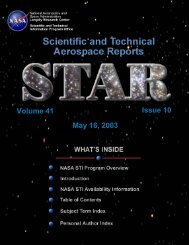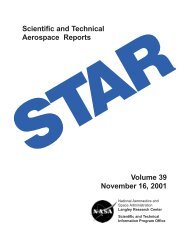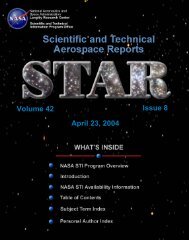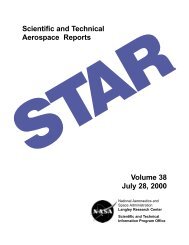Create successful ePaper yourself
Turn your PDF publications into a flip-book with our unique Google optimized e-Paper software.
82<br />
DOCUMENTATION AND INFORMATION SCIENCE<br />
Includes information management; information storage and retrieval technology; technical writing; graphic arts; and micrography. For<br />
computer program documentation see 61 Computer Programming and Software.<br />
20030020867 Smithsonian Astrophysical Observatory, Cambridge, MA, USA<br />
US Astronomers Access to SIMBAD in Strasbourg, France<br />
Eichhorn, G.; Oliverson, Ronald J., Technical Monitor; March 2003; 2 pp.; In English<br />
Contract(s)/Grant(s): NAG5-8413; No Copyright; Avail: CASI; A01, Hardcopy<br />
During the last year the US SIMBAD Gateway Project continued to provide services like user registration to the US users<br />
of the SIMBAD database in France. Currently there are over 4300 US users registered. We also provided user support by<br />
answering questions from users and handling requests for lost passwords when still necessary. Even though almost all users<br />
now access SIMBAD without a password, based on hostnames/IP addresses, there are still some users that need individual<br />
passwords. We continued to maintain the mirror copy of the SIMBAD database on a server at SAO. This allows much faster<br />
access for the US users. During the past year we moved this mirror to a faster server to improve access for the US users. We<br />
again supported a demonstration of the SIMBAD database at the meeting of the American Astronomical Society in January.<br />
We provided support for the demonstration activities at the SIMBAD booth. We paid part of the fee for the SIMBAD<br />
demonstration. We continued to improve the cross-linking between the SIMBAD project and the Astrophysics Data System.<br />
This cross-linking between these systems is very much appreciated by the users of both the SIMBAD database and the ADS<br />
Abstract Service. The mirror of the SIMBAD database at SAO makes this connection faster for the US astronomers. We<br />
exchange information between the ADS and SIMBAD on a daily basis. The close cooperation between the CDS in Strasbourg<br />
and SAO, facilitated by this project, is an important part of the astronomy-wide digital library initiative. It has proven to be<br />
a model in how different data centers can collaborate and enhance the value of their products by linking with other data centers.<br />
We continue this collaboration in order to provide better services to both the US and European astronomical community. This<br />
collaboration is even more important in light of the developments for the Virtual Observatory projects in the different<br />
countries.<br />
Author<br />
Astronomy; International Cooperation; Data Bases; Internet Resources<br />
Includes cost effectiveness studies.<br />
83<br />
ECONOMICS AND COST ANALYSIS<br />
20030020952 NASA Ames Research Center, Moffett Field, CA, USA Computer Sciences Corp., USA<br />
Applicability of Markets to Global Scheduling in Grids: Critical Examination of General Equilibrium Theory and<br />
Market Folklore<br />
Nakai, Junko; VanDerWijngaart, Rob F.; January 09, 2003; 38 pp.; In English; IPG Workshop, Feb. 2002, Palo Alto, CA, USA<br />
Contract(s)/Grant(s): RTOP 704-40-24; No Copyright; Avail: CASI; A03, Hardcopy<br />
Markets are often considered superior to other global scheduling mechanisms for distributed computing systems. This<br />
claim is supported by: a casual observation from our every-day life that markets successfully equilibrate supply and demand,<br />
and the features of markets which originate in the general equilibrium theory, e.g., efficiency and the lack of necessity of 2<br />
central controller. This paper describes why such beliefs in markets are not warranted. It does so by examining the general<br />
equilibrium theory, in terms of scope, abstraction, and interpretation. Not only does the general equilibrium theory fail to<br />
provide a satisfactory explanation of actual economies, including a computing-resource economy, it also falls short of<br />
supplying theoretical foundations for commonly held views of market desirability. This paper also points out that the argument<br />
for the desirability of markets involves circular reasoning and that the desirability can be established only vis-a-vis a<br />
scheduling goal. Finally, recasting the conclusion of Arrow’s Impossibility Theorem as that for global scheduling, we conclude<br />
that there exists no market-based scheduler that is rational (in the sense defined in microeconomic theory), takes into account<br />
utility of more than one user, and yet yields a Pareto-optimal outcome for arbitrary user utility functions.<br />
Author<br />
Market Research; Economic Analysis; Distributed Processing; Programming (Scheduling); Computer Networks;<br />
Optimization<br />
114


